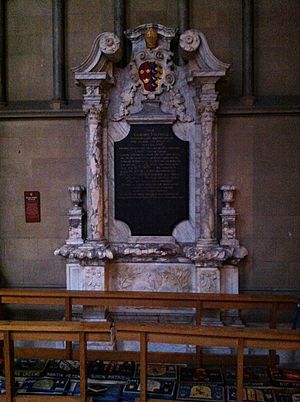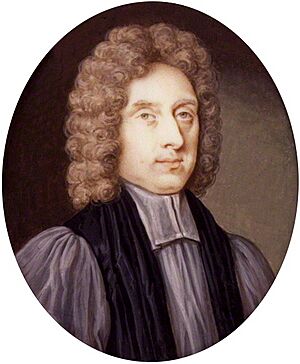William Fleetwood facts for kids
William Fleetwood (born January 1, 1656 – died August 4, 1723) was an important English preacher. He became a Bishop and later the Bishop of Ely. People remember him for creating a way to measure how prices changed over time. This idea is called a price index. He wrote about it in his book, Chronicon Preciosum, in 1707.
William Fleetwood's Life

William Fleetwood came from an old family in Lancashire, England. He was born in the Tower of London on New Year's Day in 1656. He went to school at Eton and then to King's College, Cambridge.
Around the time of the Glorious Revolution (a big change in English government), he became a priest. Soon after, he became the rector (head priest) of St Austin's in London. He also became a lecturer at St Dunstan's. In 1702, he became a canon (a type of priest) at Windsor. In 1708, he was chosen to be the Bishop of St Asaph. Then, in 1714, he moved to become the Bishop of Ely. He passed away in Tottenham, Middlesex, on August 4, 1723.
Fleetwood was known as one of the best preachers of his time. He was very good at learning and speaking. People respected him greatly. As a bishop, he was much better than many others. He strongly supported the Hanoverian royal family. Even though he was a Whig (a political group), Queen Anne liked him. He disagreed with the idea that people should never resist the king. This caused some arguments with the Tory government in 1712 and with writer Jonathan Swift. However, he never got into personal fights.
His main writings include An Essay on Miracles (1701) and Chronicum preciosum (1707). He also wrote Free Sermons (1712). This book included speeches about the deaths of Queen Mary, the Duke of Gloucester, and King William. The introduction to Free Sermons was ordered to be publicly burned by Parliament. But, it became even more popular when it was published as No. 384 in The Spectator magazine. All his works were collected and published in 1737. His memorial, made by Edward Stanton (sculptor) and Christopher Horsnaile, is in Ely Cathedral.
Understanding Chronicon Preciosum
In his book Chronicon Preciosum, William Fleetwood asked an interesting question. He wanted to know how much £5 from the year 1440 would be worth today. This question came up because a friend might lose his spot at Oxford University if he earned more than £5 outside income. The university rule was made in 1440.
Fleetwood showed how much food, drink, meat, cloth, and books you could buy in 1440 compared to his own time. He made tables showing how prices changed for many goods. He noticed that most prices went up at a similar rate. He figured out that £5 in the 1400s would be worth about £28 or £30 in the early 1700s. This was a very early way to understand how money's value changes over time.
Adam Smith, a famous economist, used some of Fleetwood's price information in his book The Wealth of Nations (1776). However, Smith did not really develop the idea of comparing buying power across different times. People truly admired Fleetwood's work and started building on his ideas in the 1800s. For Edgeworth, another economist, Chronicon Preciosum was "the oldest and one of the best treatises on index-numbers."
Fleetwood's sermons often talked about money and the economy. For example, he gave a speech against "clipping" gold coins. Clipping meant shaving off small pieces of metal from coins, which made them worth less. In his sermon, he explained how money works and why it's bad to damage or reduce the value of coins. He also published a sermon about paying debts during the South Sea panic. This was a time when many people lost money in a big stock market crash.
Fleetwood seemed to be a very practical Christian. From what we know about his life, he was also a very involved bishop in politics.
Economic Writings
- A Sermon against Clipping (London, 1694)
- Chronicon Preciosum: or An Account of English Money, the Price of Corn and Other Commodities, for the Last 600 Years (London, 1707)
- The Justice of Paying Debts (1718)
 | Charles R. Drew |
 | Benjamin Banneker |
 | Jane C. Wright |
 | Roger Arliner Young |


